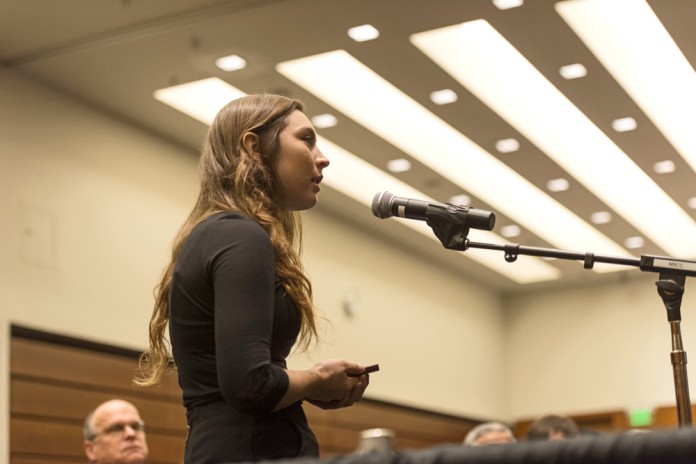Photos and interview by Mark Brocher, Staff Photographer
What was your main purpose for attending the UC Regents meeting today?
External Vice President of Statewide Affairs Alex Choate: “It was definitely the agenda item in the education committee about invigorating the Master Plan. That’s an initiative that Jonathan and I started up from campus through some loose talk in the office with former president Harrison Weber, which just eventually escalated really quickly.”
Do you have any specifics?
Choate: “The AS Senate passed a resolution last quarter supporting the re-envisionment of the California Master Plan for Higher Education, primarily requesting the stakeholders, including legislators, alumni, staff, faculty, and students, and of course the 3-tiers of higher education, to come together, sit down, and come up with some kind of foresight for what higher education in California will look like.”
Associated Students President Jonathan Abboud: “One of the regents was saying, ‘We know the problems from back then, but what are the problems now?’. We should figure out what the new problems are. Put together a group of people who have a lot of different perspectives to figure out what the problems are, and then you can create a plan to solve the problems. It’s pretty simple.”
So one of the problems mentioned is that students aren’t prepared [coming into UCSB]. Have you encountered that? Are you working on something to resolve that?
Abboud: “I think I heard about it at the CCs [community colleges], but that was never on our radar, but that’s why we said get a wide perspective–because I never would think that, but somebody else would.”
Choate: “Yeah, the charge of the resolution and what we’re asking Napolitano, among the other three tiers, to do is just to first form the committee and then sit down, and like Jonathan was saying, then figure out. As far as we’re concerned, that was the first step in the campaign.”
Abboud: “It’s getting people to figure out the problems… We didn’t have recommendations for the plan… They said ‘you have to figure out what the problems are before you make a plan.’ We don’t want to be like ‘we’re so smart that we know so much that we will decide what the plan’s going to be like today.’ We didn’t want to do that, so we just said we should put the process in motion.”
Has anybody come up to you, Alex, to respond to what you said in the public comments session?
Choate: “Unfortunately no, but [UC San Diego’s Vice President of External Affairs and University Affairs Chair Vanessa Garcia] actually wrote an intended speech to give to the Board of Regents which got handed off to Napolitano, and I gave some input into that as well. So Napolitano will definitely hear kind of what Jonathan and I have been discussing at Santa Barbara, and I’m sure she’ll pass it along to the rest of the Regents as well.”
Did you have any questions or concerns about the new online classes?
Choate: “I did. Just with Gov. Brown talking about it being 100 percent online, and no human interactions… Of all the students I’ve talked to across all the UCs, I’ve never heard one student support that kind of notion of online education.”
Abboud: “Everybody like makes fun of that kind of online education. People are like ‘it’s cool if you like have some sort of like interaction.’ But people call that kind of education below them as UC students.”
Choate: “And I think it’s also important to look to San Jose State University. They tried doing MOOCs [Massive Online Open Courses] at their university, and it failed massively. The percentage rate of passing students just dropped significantly… They were trying to model it off similar models from I think like Yale and Harvard, and it’s a different kind of student who goes there–you know, more self-motivated. And at San Jose State you needed a more of the personal interaction to be successful in the class. And so I think the empirical evidence that Gov. Brown was looking for was that, and unfortunately he didn’t recognize that.”
Have either of you taken an online class before?
Choate: “I haven’t, because I know I wouldn’t do well in it, which is why the human interaction for me is so important.”
Abboud: “I never had the opportunity to, but I probably wouldn’t. I would be more likely to recognize one as valid…if it’s like human interaction mixed with online, instead of one that’s just click through the slides online, and then click as fast as I could, and then get to the test and click through the answers really fast. That’s what basically I imagine it would be like, so I wouldn’t want that at all. I think that’s like a waste of money.”
Do you feel that online education would degrade your UC education?
Abboud: “It depends on how you do it. If you do it the click through slides and get to the test and answer the bubbles [approach], that degrades it. If they have a nicer way of doing it that’s hybrid and all, it could make it better, but we don’t know… The pure online with zero humans would 99 percent sure degrade our education, in my opinion.”
Choate: “The model that Gov. Brown was talking about I wouldn’t support that at all, and especially comparing it to an in-class, as someone said it, like ‘on residence’ class. I wouldn’t even compare the two. But I mean there is hope, though, because I was hearing one Regent say that they believe it should be 100 percent as supplement rather than a substitute. I think that’s the important thing to take away from that, and also something I’ve been hearing other students echo.”











